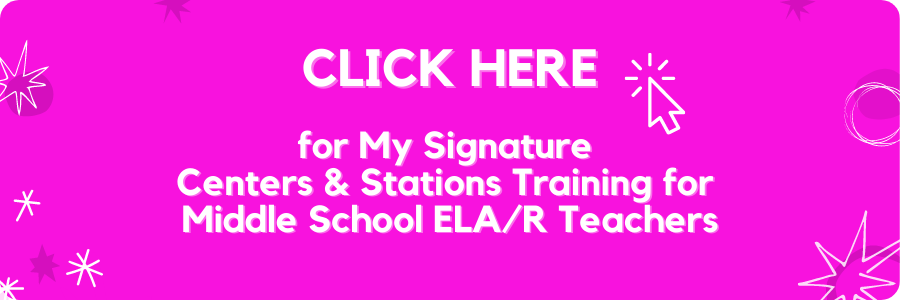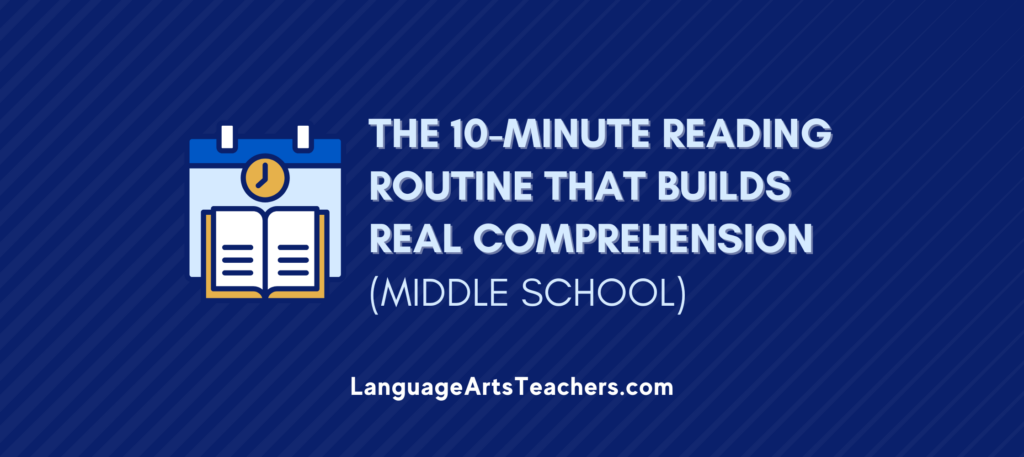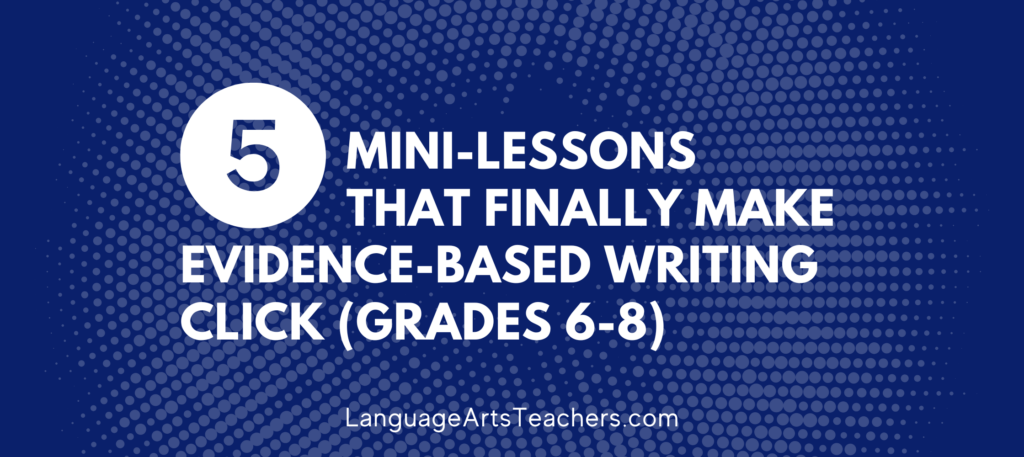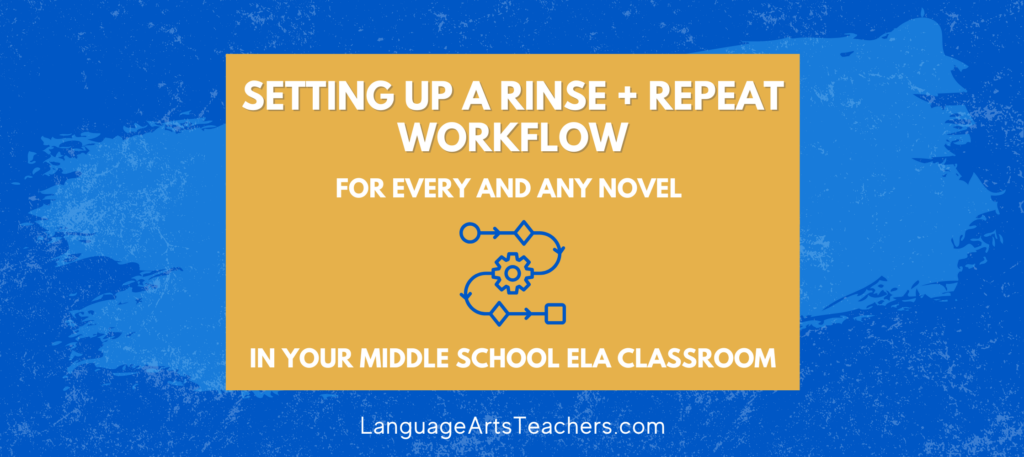Let’s dive into the BEST reading workshop strategies for Middle School ELA (coming at you live in just a sec).
First, a foundational Q:
What is a “Reading Workshop”, and why is it referred to as a “workshop”?
The A to ^that Q:
We’ll start here just so we’re all on the same page. Basically, “reading workshop” is a way to run your classroom where you teach a very short (like 10 minutes or less) whole-class mini-lesson on a super specific skill and then right away, students get to implement that skill. As they’re working on applying and doing the skill you just taught, you as the teacher get to conference with the students in small groups so you can support, check in, scaffold, guide, challenge, etc. all the learning. The workshop usually ends with small groups sharing what they’ve done with each other or with the whole class.
Now at the elementary level, you’ll typically see all 22 littles gather together on the learning rug (so fun, remember those days?) for the itty bitty mini-lesson. Then they go back to their cute little tables and get to work.
In a middle school ELA class, that may not be a physical or logistical possibility. You may have 30+ nearly adult-sized bodies in a room that was originally designed for 20 people (because, you know, class sizes and all). So whether you can physically get your students huddled together for the mini-lesson or not, that’s the basic way it rolls out.
- Note: If you have kind of a coaching mindset or personality, you can totally get away with saying, “Huddle up, everyone!” and get your students to stand up and gather ‘round (or huddle) as you present the mini-lesson.
- I’ve seen teachers do this just outside their door if they have ample hall space (always jealous of those large corner classrooms, lol).
- What I’ve had fun with doing, just to shake things up a bit, is to simply have my students meet up in the front of the classroom where I’m standing at the board, and they’re gathered in a mix of sitting on the floor, sitting on the desktops, and standing all right there with me.
Quick Q: Why is everyone getting up and moving to another spot for the brief mini-lesson? Why don’t they just stay seated and get the lesson via my projection board?
Semi-Quick A: Psychologically, when students move (even just a few feet away) from their usual desks, they’re ready to actually ~hear~ the mini-lesson. Their focus is on point. They associate the physical act of moving to another location with a new learning experience. They aren’t distracted by whatever else is also on top of their desks or underneath them. They are all looking in the same direction, physically facing you without having to turn awkwardly in their chairs and hold that position for any length of time. Essentially, you’ve got their (almost, just about as close as we can get) undivided attention.
Ok. Sorry that wasn’t literally a Quick A but there’s a lot of brain work behind why we have students move elsewhere in the classroom for the mini-lesson 🙂
Let’s back up for a sec and take a big, bird’s eye view of a middle school ELA/R reading workshop in action by looking at what the must-do’s include:
Must-do’s for Reading Workshop:
- A focus or a purpose for each day (standards-based / skill-based mini-lesson)
- Student choice for reading after the mini-lesson (more on that in a minute)
- Ample, generous time for actual reading on a regular basis in class
- Accountability (not the same as grading or assessing)
- Start small (a month-long “unit” rather than committing to a full year)
Here’s what a 45 – 60 minute class schedule could look like for Reading Workshop:
5 min: Bell ringer / warm up / do now
10 min: Reading mini-lesson (I’ll share ideas for that in a bit)
25 min: Reading time (partner/small groups, with the teacher, independent options)
5 – 15 min: Closure / formative assessment (relate back to mini-lesson or bell ringer, exit ticket, reading response, book talks, etc)
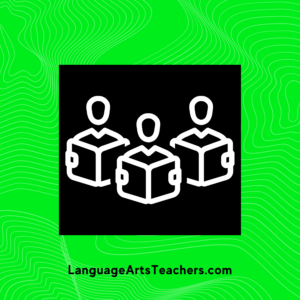
FAQ: Reading Workshop
How is a Reading Workshop model different from doing stations or centers in my class? Isn’t it basically the same thing?
- I hear you. With stations or centers (click here for my FREE training on how to set up and run them in your middle school ELA class), we’re talking about students working collaboratively on various activities throughout a class. Students may move from table to table where each “station” or each “center” contains a different learning activity. Stations or centers (I tend to use those terms interchangeably) could last 15 – 20 minutes with a goal of completing 3 station activities in a one-hour class period.
- The Reading Workshop model, on the other hand, doesn’t involve students divided up into equal groups where each group is working on a different lesson for a set amount of time. In a Reading Workshop model, after the mini-lesson, students will work on what they individually need to work on. For some students, they might simply need time to read. For other students, maybe they do need to group up to work through a similar reading-related task (like crafting a reader-response with a little extra teacher guidance). There aren’t specific “station” activities that students have to move through at a certain pace for a certain amount of time in a Reading Workshop. What students do during Reading Workshop is based on what they are reading coupled with applying the skill or teaching concept from the mini-lesson they all received at the beginning of class.
Do I have to do Reading Workshop every day? What about everything else I have to teach?
- Nope, not at all! Now of course you’ll see some Pinterest-Perfect classroom setups where it ~seems~ like every day is this incredible workshop experience full of non-stop creativity and flow and flexible lessons and—- But no, that’s not really how it is. You can do a reading workshop every Tuesday through Thursday if you want, and keep Mondays and Fridays as “regular” class days. You could do reading workshop just two days a week. If you are blessed with a longer block schedule, you could do reading workshop for just half the class time, and then you’d still have the other half of the time to work with.
- When it comes to “everything else” you have to teach, just remember that SO. MUCH. of that can actually be done one mini-lesson at a time, via the reading workshop model. But if seems too loosy-goosy for your style, just do reading workshop two days a week, or even every day but just for a month-long period of time.
Am I supposed to do a mini-lesson each day for Reading Workshop?
- Not necessarily. For instance, you can have a reading workshop every day in class without having a specific mini-lesson. You would do this if you gave a mini-lesson yesterday, and let’s say the task or practice is still carrying over today. Maybe you simply review the concept from yesterday’s mini-lesson real quick and then students have more time to read, work, and implement. That’s totally fine.
How do I know what mini-lesson topic to do each time?
- As far as what TOPIC to teach during the mini-lesson, look at your reading standards or guidelines for ideas. Maybe you do a bite-sized lesson on main idea & details, and then students are reading and looking for (hi-lighting, marking, annotating) main idea & details as they read. Other ideas could include things like author’s purpose, figurative language, claims and counter-claims, details of setting, internal vs. external conflict, stage directions, etc. Your actual topic decision would go like this:
- Consider the genre (fiction, nonfiction, poetry, plays)
- Choose a skill or standard specific to that genre
- Break up complex standards into separate, smaller, mini-lessons
- Think of different ways to teach students each standard (because those different ways can be used again and again all year long—-Same standard, different ways of teaching it, and lots of student exposure and practice with the standard)
What about classroom management during the actual reading time?
- Yup. You have to get all your ducks in a row on this one. You can have a very enjoyable, peaceful reading workshop experience when your students know (without a doubt) what their reading time looks like, sounds like, and how they solve their own problems that will inevitably come up.
- What kind of problems? Oh, anything from:
- My hi-lighter ran out. Where can I get a new one?
- My book is boring. Can I choose another one to start with?
- There are 5 people in our reading group, but only 3 articles. Where do we get two more?
- I don’t understand the inference stuff. I’m stuck.
- I wasn’t here yesterday. What did we do?
- Can I go to the bathroom? Is someone already out?
- I’m done. Where do I put my work? What do I do now?
- I didn’t have enough time. Are we doing this tomorrow, too?
- ^^^When your students can appropriately take care of those situations without interrupting you (‘cuz you’ll be conferencing with students during this time) or anyone else, then you’ll have a smooth-running reading workshop experience.
What am I doing as the teacher during the reading time?
- This is my favorite part! Yes, you are going to have reading conferences with students during every situation where you’ve finished the mini-lesson and students are now off and running with it.
- You may re-teach yesterday’s or today’s lesson for students who were absent or late to class.
- You may work with just one student or with a small group of students who need similar scaffolding, support, or challenges based on their learning needs.
- You may simply read with a student and discuss their ideas based on the mini-lesson skill you’ve been working with lately.
- Maybe you’re just checking in with students to see how they’re progressing through their novel, or with their nonfiction article, or whatever it is they’re reading. Sometimes that’s all it is.
How do I grade or assess? I’m supposed to always have a “product” that shows learning at my school.
- The “product” or the assessment can be any number of things:
- Student work like notes, markings, or ideas jotted down in the margins
- Teacher notes from reading workshop conferences with students
- Student progress as they work through reading-related tasks like short answer responses to the reading, or discussion task cards, etc.
- A quick quiz (just 4 – 5 questions) that assesses the mini-lesson skill(s) from that week
- And here’s the thing: You don’t have to assess all students in the same way on the same day, either. When you meet with your students, know what you’re looking for and keep a clipboard with you so you can jot down notes or scores for standards & skills you’re trying to assess. It can be so informal, done right there in the moment in class without you needing to take anything home to grade separately. Plus, it’s good for students to see you jotting down little notes or marks about their progress because that right there helps support the accountability piece.
What about students who just never seem to get into the reading? Like the ones who just won’t do anything, no matter what?
- You’ll pretty much always have that situation, so don’t take it too personally. What this means is that you may need to keep these students a little closer to you, that’s all.
- Maybe you check in with them more often. Perhaps you spend a bit more time reading with them or talking with them about their reading. And often, they just need more support in the beginning to figure out exactly what it is that they like to read.
- For instance, if you realize that a student just doesn’t seem to get into any book or novel, and you’ve tried literally everything, well then, maybe that student simply doesn’t like fiction. It’s ok. You can assess just about every reading skill with nonfiction if that’s what they’re into.
- And when it does come time to officially get some feedback on fiction, try to choose a short story or even just an excerpt or passage that is at least a similar topic to something the student really enjoyed from the nonfiction world. You can say, “Hey, I know it’s a story and you don’t like the stories, but read this and tell me if the part about the drones is even accurate based on everything you know and have been reading about drones.” < < That’s totally worked for me!
- Once they’ve read the story, or read it with you or with headphones for an auditory experience, you can discuss and assess all kinds of other things that are mandatory.
What if I’m required to teach a whole-class novel and then all my students are reading at a different pace?
- I love LOVE so much the experience of us all reading the same novel at least once per school year because you can refer back to that common novel for so many other teachable moments! (i.e. Remember in Bud, Not Buddy when . . . Yeah, that’s an example of irony).
- Ok, so what if all your students are at a different pace and are finishing (or not) the novel? You can find or record an audio version of the novel so that students can listen as they read along at the same time. You can set up a goal, or have your students set goals, for how much they plan to read each week. You’ll have to decide if they can read outside of class, or just inside of class.
- You’ll have some students who miss a lot of school and don’t read or can’t read outside the classroom. You’ll have other students who get so into the book they take, borrow, or buy it themselves and finish within a week (or less) and can’t wait to talk about it.
- ^^^All that being said, it’s the reality, and it’s ok! You can still teach your mini-lessons and for those who already finished the novel, they will go back into the novel to re-read certain sections in order to prove mastery (or just practice) the skill you taught in the mini-lesson. That’s totally fine.
- For students who are moving through the novel at a slower pace, you can even summarize certain parts and then direct them to read the next part in order to practice or complete the skill based on the mini-lesson. Is that a terrible idea? Maybe. Some might hate me for even mentioning that as an option! But when you only have 42 ELA/R minutes and you have a couple students who are just absent sooooo much (I know, we’re working with the school counselor and the family and there’s just a lot of issues going on—-is that just me, or can you relate, too?), then you have to do what you can with what you have in front of you that you can actually control. I said what I said. It’s not ideal, but sometimes you have to get creative.
- Otherwise, don’t be afraid to allow fast finishers to choose to move onto another novel of their choice while everyone else continues working through the whole class novel. And likewise, don’t be afraid of speeding things up when you have to by reading with small groups of students or having them listen and follow along with an audio version.
Finally, the elephant in the room that I didn’t address here is related to classroom and behavior management during the independent or small group reading time that comes after the mini-lesson.
Therefore, I 1000% recommend you grab a spot at my FREE “Centers & Stations” training because the organization and setup of how I manage the classroom in that training is absolutely applicable to how I manage the classroom for the reading workshop model. I know you’ll find it wildly valuable. Game changer, for sure!
Helpful Resources for Continuous Study of the Reading Workshop Model:
Time crunch: How to teach reading or writing workshop in less than an hour a day
https://amandawritenow.com/how-i-teach-reading-and-writing-workshop-in-54-minutes/
Getting Started When Reading Workshop feels confusing or overwhelming
LearninginRoom213.com FREE Masterclass that breaks it down in simple, actionable terms: https://jackie-414f.mykajabi.com/read-workshop-masterclass
10 Tips for Managing Reading Workshop in the Middle School Classroom
https://www.2peasandadog.com/2019/04/managing-readers-workshop.html
Reading Workshop Basics: Modeling, Guided Reading, Independent Reading, Conferring
https://middleschoolcafe.com/what-is-readers-workshop-and-how-does-it-benefit-middle-school-students/

